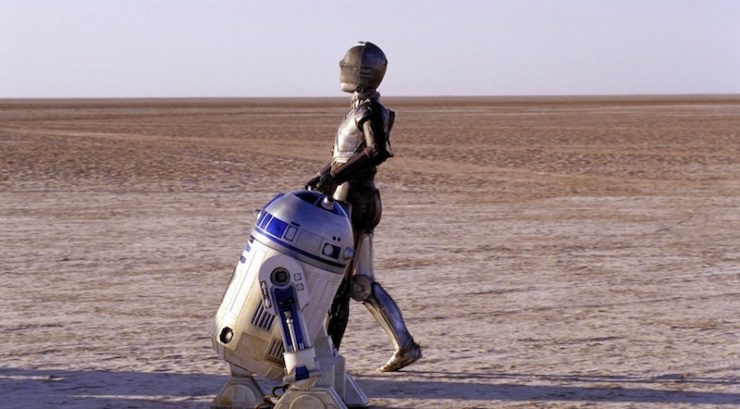It’s no great secret that R2-D2 is the real hero of Star Wars. In fact, that might be the fandom’s favorite joke of the past four decades—everyone would be dead, multiple times over, without that rolling trash can’s help. Same goes for C-3PO, if we take into account how Artoo relies on him to redirect the bad guys with his babbling and multitude of diplomatic excuses.
But the truth of the matter is a bit uglier than that. Because the only reason that R2-D2 is capable of helping in the first place is because he’s treated like a person… instead of an expensive piece of hardware.
It’s pretty clear, even on a first viewing, that the Star Wars universe doesn’t treat droids well. They are bought and sold like computers rather than beings with clear personalities, preferences, and desires. They are ordered en masse as aids, weapons, and soldiers in wartime. Humans and aliens have the ability to control them with restraining bolts, and the permission to wipe the minds of droids as they see fit; this could be used to prevent them from recalling sensitive events and information, or to stop a droid from developing an entrenched personality which could potentially cause problems for their owners. It’s common to treat them as tools, to the point that droids themselves have internalized the abuse—many models will speak ill of droids they consider beneath them, and we even witness droid-on-droid torture in Jabba the Hutt’s palace on Tatooine.
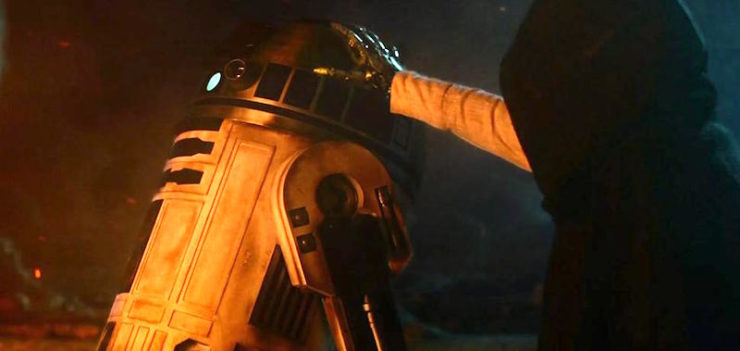
But droids are desperately needed here. In this strange retrograde vision of the future-past where ships can travel at lightspeed and people fight with weird ray guns and laserswords, droids are the only thing keeping everything running smoothly. They perform ship maintenance, they communicate across platforms, they carry around documents and schematics, they have internal keys and software that allow them into most systems across the galaxy. Having a droid (or droids plural) is essentially like having your own personal hacker, replete with a library’s worth of untold useful facts and figures. Especially astromech droids; these multitools of the universe can do everything from basic piloting to skillful repairs to database download and alteration.
Is it strange that the Star Wars galaxy runs this way? You bet. But it’s the only system they’ve got, and it means that having the right droid copilot absolutely stands between you and victory.
Hilariously, a huge portion of the galaxy hasn’t managed to figure this out.
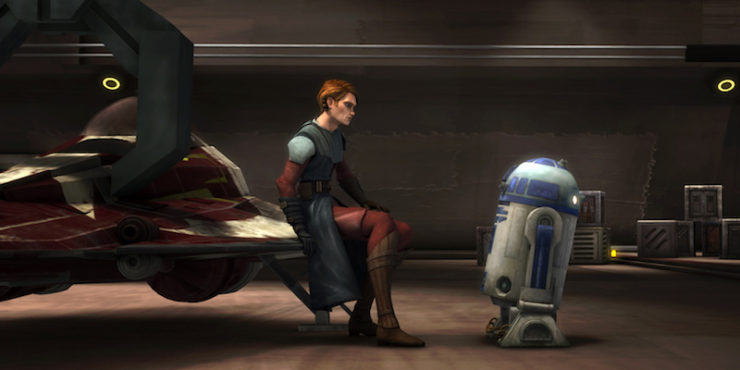
This attitude stretches back throughout the ages, and is particularly a problem where the Jedi are concerned. In the Clone Wars television series and indeed the prequels, Anakin Skywalker gets tons of flak for treating Artoo like a friend instead of a machine around his fellow knights. Obi-Wan and Mace Wind are adamant about this—they both care deeply for organic sentient creatures, but applying that sentience to a droid is ridiculous as far as they’re concerned. And this creates an iffy sticking point as to why the Jedi didn’t feel the need to abstain from a lengthy galactic war in which they played generals to the clone army; the Jedi were sent across the galaxy to obliterate armies of droids. As they were not destroying anything “living” in those battles, they didn’t not perceive any problem with that arrangement. This is somewhat distressing the when it is made clear in the very same series that the battledroids are often cognizant that they are about to be murdered; they show clear concern when they see that a Jedi has shown up in battle and occasionally run away when they’re about to be dismantled.
Given the chance to exist without memory wipes, droids develop distinct personalities, and even show psychological distress similar to humans and aliens throughout the galaxy. In Star Wars: Rebels, we meet Chopper, Hera’s astromech pal and very first shipmate on her freighter the Ghost. Chopper and Hera met when she dragged him from the wreckage of his Republic Y-Wing; he crashed on her home planet of Ryloth during a Clone War battle. Chopper is a war hero and is willing to say as much to strangers when they ask about his past. But he has hangups about the old Y-Wing bombers; when forced to get into one as his friends liberate a squad of them for the Rebel Alliance, he panics and tries to run away. On a trip back to Hera’s home on Ryloth, he encounters the wreckage of the fighter he crashed in and freezes in front of it, clearly distressed and hypnotized by the sight. In short, Chopper shows every sign of having Post-Traumatic Stress Disorder. If a droid is capable of retaining mental trauma from past events, they is really no question about whether or not they should be treated like sentients.
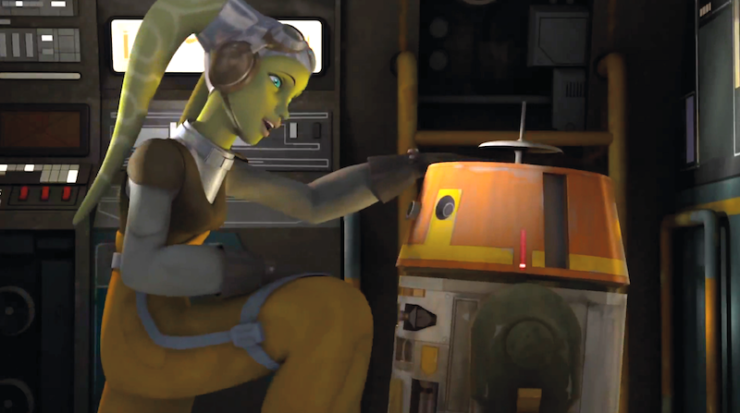
The Separatists, the Empire, and the First Order all have poor track records when it comes to treating any non-human with even basic decency, to say nothing of empathy. The Empire in particular has a track record of enslaving other races, so it’s hardly surprising that they would fail to view droids as worthy of consideration. But the detriment of this philosophy becomes plain as binary sun daylight when you realize all it has cost them—Chopper being a perfect exhibit in that regard. The old astromech’s friendship and affinity for Hera makes him an indispensable part of her crew, particularly whenever they need Imperial intel. Chopper frequently allows fellow shipmate Sabine to paint him in the Empire’s colors and they walk him onto countless Star Destroyers and bases to slip into the enemy’s databases, look for captured friends, and confuse their foes as they make escapes. Agent Kallus, an Imperial defector, actually makes a point of acknowledging how the Empire’s disregard for droids is putting them at a comical disadvantage, bemused by Chopper’s ability to slip in anywhere unseen.
The only reason that R2-D2 and C-3PO make it off the Tantive IV is because no one imagines that this odd couple would be carrying the Death Star plans. Princess Leia knows this—it’s precisely why she hands them off to Artoo in the first place. In fact, you could take this one step further and suggest that this is also half the reason why Artoo prefers to have his buddy Threepio around; he’s innocuous enough on his own, but once you pair him with someone as garish and nervous as the protocol droid, it’s extremely hard to believe that he could be doing anything covert. If you don’t think Artoo is canny enough for that (heh heh, canny), consider how expertly he maneuvers Threepio’s reassuring candor to get his restraining bolt removed by Luke once the duo are bought by Owen Lars.
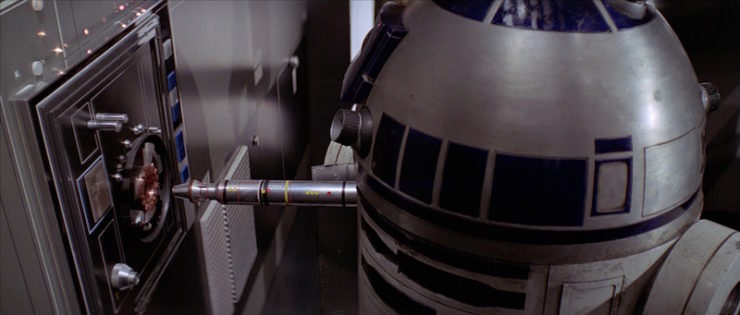
That’s right, R2-D2 uses your droid prejudices to his advantage. He’s the long-running master of this game.
Years later, the bad guys are still undervaluing droids: when BB-8 accompanies Finn, Rose, and DJ onto Supreme Leader Snoke’s ship in The Last Jedi, they drop a big black box over him, and he does a passable imitation of an oversized mouse droid as he tags along. The only reason they’re noticed? Another droid spots BB-8’s disguise. No humans on the First Order flagship catch wind of this very strange model rolling along behind Finn, it takes another BB unit to spot the error. And even after Finn and Rose are caught, no one thinks to nab their droid. No one so much as marks its absence as Finn and Rose are hauled off to be executed. This gargantuan blindspot is precisely what allows BB-8 to later climb into a walker and help Finn and Rose escape. Nothing in this universe has changed, not even after all these years. The droids may have gotten a little smarter—as evidenced by BB-9E noticing that something is amiss—but the people are as blind as ever.
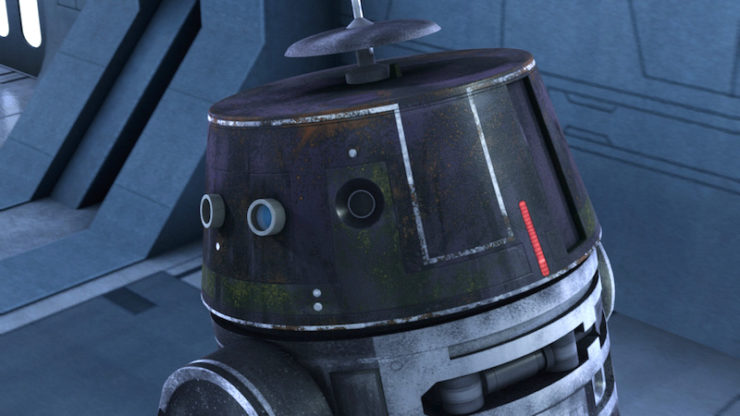
Even the heroes have their own prejudices to overcome in this regard. Most of the Ghost crew need to be reminded of Chopper’s usefulness now and again (granted, that’s partly due to the fact that Chopper is also an expert troll and endearing pain in the butt). Leia tries to hurry Threepio up during a mission in Star Wars: Bloodline and is shocked when the protocol droid reluctantly informs her that he’s having to deal with an excess of information from a rather chatty and lonely computer… reminding Leia once again of Threepio’s own sentience. Poe insists that BB-8 is “one of a kind,” perhaps indicating that he believes that his droid is better than anyone else’s, though the Resistance pilot clearly thinks of his droid like a child or beloved pet, so some of that pride is inevitable.
And then there is perhaps the most upsetting example of the “good guys” disregarding the sentience of their droid counterparts: Cassian Andor’s enlistment of former Imperial security droid K-2SO. Kaytoo started out as a drone with no seeming personhood whatsoever—it is Cassian’s reprogramming that leads to his subsequent personality quirks and sentience. And though Kaytoo is loyal to his friend, he clearly values his autonomy on a certain level, to the point of deliberately disobeying orders just to prove that he can, now that he is no longer Imperial property. It makes his comment to Jyn before their departure from Yavin 4—“I’ll be there for you, Jyn…. Cassian said I had to.”—upsetting even while it’s humorous. K-2SO sacrifices his life for Cassian and Jyn, but we never know how much it would have meant to him to have truly been given the choice by the human who mattered most to him. After all, he’s not like R2-D2 and C-3PO, who have been hanging around the same family for generations. He just got here.
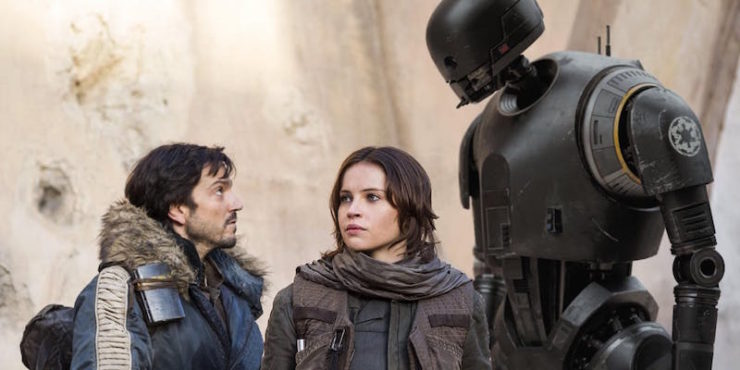
There’s still no question about it. If the “bad guys” of Star Wars actually bothered to think of droids as sentient beings worthy of attention and consideration, they’d have won every single war. It wouldn’t have been difficult either; just let their own droids develop personalities and treat them like crew and soldiers and operatives. Listen to what they have to say, particularly when they make note of some weird droid hanging around a datacore.
Guess we should just be real grateful that they never thought of that.
Emmet Asher-Perrin is a staff writer for Tor.com. You can bug her on Twitter and Tumblr, and read more of her work here and elsewhere.










